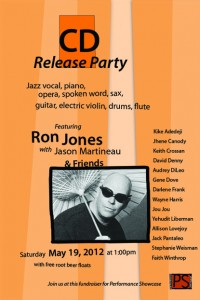 Recently I was invited to read one of my published stories at an upcoming arts event, and it’s made me think anew about the word “performance” when it comes to writers reading their work in public. When you read in front of an audience, do you think of yourself as a performer?
Recently I was invited to read one of my published stories at an upcoming arts event, and it’s made me think anew about the word “performance” when it comes to writers reading their work in public. When you read in front of an audience, do you think of yourself as a performer?
The event at which I’ll read celebrates the release of a spoken word and music CD by Ron Jones, world-renowned storyteller.
As a storyteller, Ron is totally at ease on stage. For his CD release party, he’s invited over a dozen singers, musicians, and spoken word artists to share the stage with him. Most of them are accomplished theater performers. I’m honored to be among the invitees.
My style, however, can hardly be called theatrical. I’m low key. I’ve never thought of myself as a spoken word artist; I just read from the page. But for this event, the event producer suggested I enhance the reading by collaborating with a musician. So we invited writer and composer Jack Pantaleo (also a good friend) to accompany me on his Celtic harp. Among all these stellar and seasoned theater performers, this creative twist may turn “just reading” into a more enjoyable experience for the audience, and perhaps for me, too.
As a writer, you may not think of yourself as a performer. Yet when you read for an audience, your listeners not only take in the words you’ve written, they also notice your gestures, they hear the inflection in your voice, they’re aware of the eye contact you make with them, and more. They notice the art of your performance as well as the art of your writing.
So how much of a performer does a writer need to be?
Given that we live in an age of marketing, branding, and platform-building, I think it’s useful to ask yourself the following:
- What is your current reading style in front of an audience? How satisfied are you with it?
- Is there an element you could add to make your readings more memorable?
- If so, what would you be comfortable doing? Costumes, props, voice, movement—these are just a few options you can experiment with.
- What does your audience expect? What do you want to give them?
- How consciously do you work at building your platform or brand? In what way does your reading style enhance it?
- How much of a performer do you want to be?
Regardless of whether the word “performer” puts you off or excites your creative juices, a reading is a performance. Adding an element of surprise can increase interest in your writing and make an audience feel they’ve received something special from you.
Drama, inflection, visuals—however you personalize your reading—will enhance your written words as well as your listeners’ experience as you take them through the journey of your story.
Learning more about who you are and who you want to be when you read in public, then deciding to experiment, in a way that feels authentic and uniquely yours, can make the prospect of performing feel less intimidating and more fun. And it offers you the writer another opportunity for creative expression.
Leave a comment, or email me. If you’re in San Francisco, check out the event details. You may want to come by and watch a few performances with an eye toward enhancing your own.
_________________________
Darlene Frank has written on a wide range of topics, including business writing, graphic design, personal growth, family history, and more. She coaches writers on how to move past obstacles that block creativity.
_________________________

{ 0 comments… add one now }